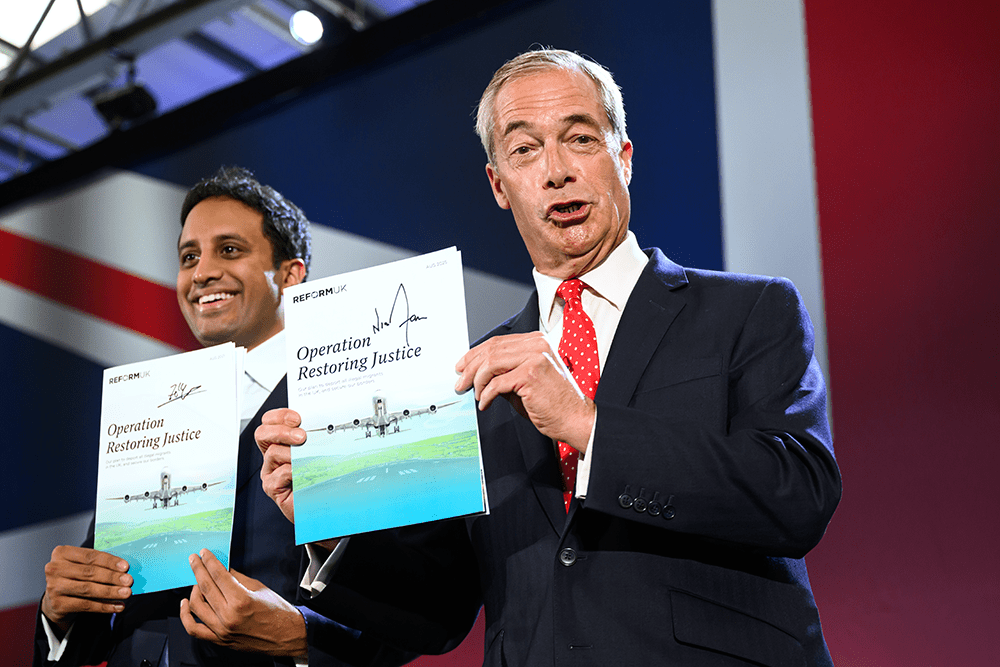It can’t be much fun, being Sir Keir Starmer right now. If the people across the country chanting ‘Keir Starmer’s a wanker’ isn’t evidence enough, consider the polls. The Labour party is not merely experiencing a dip in support – it is in a state of freefall. A YouGov poll this week has them on 20 per cent. This is a party that won a commanding majority just over a year ago. Meanwhile Find Out Now has Labour on a scrotum-tighteningly excruciating 18 per cent – their equal worst poll ever. The same poll has the feared Farage on 33 per cent: way out in front.
He would return to Islington like a victorious Celtic chieftain, hoisted on his shield. Which is a lot better than being ousted by Angela Rayner in a Birmingham conference hall, or losing to a grinning Nigel Farage
At the heart of this Chernobyl-esque political meltdown is the staggering unpopularity of the hapless leader himself. Starmer’s personal approval ratings have plunged to abyssal depths rarely seen outside James Cameron movies. One recent Ipsos poll recorded his disapproval at minus 54, the worst rating for any Prime Minister one year into their term since records began.
Then there’s, well, everything else. The economy is stagnant. The interest on our borrowing is 8 per cent of government spending. Ex-Bank of England bigwigs talks of ‘calling in the IMF’. Meanwhile the government can’t get laws past its own MPs, and has apparently lost all control of our borders.
In the face of this, Starmer – a man who says he never dreams, and I can certainly believe he never dreamed things would be this bad – must be tempted to walk away. He is 62. He has a nice young-ish family. Some say he never really wanted the job anyway. Why not chuck in the towel? And let hungry rivals take over?
If he is tempted by this, I have some advice for him. There is one extraordinary thing he can do which could transform his polling, prospects, and career: call a referendum on rejoining the EU.
I say this not because I personally desire it. I was a reluctant Leave voter (I liked the idea of the EU; disliked the reality), I would probably vote Leave again (with similar sighing reluctance). However, I can also see a remarkable logic that should drive Starmer, against all his cautious instincts, to play this dramatic card.
Consider how it would unfold, if Sir Keir Toolmakersson came out of No. 10 tomorrow, walked to the lectern, and made his announcement to the press. He could and should phrase it like this:
‘We have reached a point of no return, the economy is in a dire state, thanks to the Tories. Our trade is being crippled, our closest allies are alienated, I have therefore decided to call a referendum on rejoining the EU in 2027. I shall be campaigning for Yes: I shall be campaigning to Rejoin.’
At once, he would upend British politics. Instead of lamely following and aping Nigel Farage, he would wrong-foot him and send Reform scurrying for the right reaction. He would leave the Tories poleaxed and perplexed. He would make the Lib Dems, Greens and SNP look like trivial extras in his own movie. He would seize and hold the political limelight, he would appear – for the first time in his dismal political career – bold, clever, imaginative.
Yes, some people would complain, but they would either be his right-wing enemies. Or his leftwing enemies. Their mewls would not matter. At the same time he would, overnight, gain the clamouring admiration of millions of voters. All those bitter Remoaners and wistful ex-Remainers – finally they would have a courageous political hero. Sir Keir Starmer. Many of his own MPs – nearly all Remainers – would fall in love with him. And stop rebelling.
The polls would surely switch, as a new perception of the PM took hold. My guess is that his popularity would surge. And Labour would win back oodles of support from the centre and centre left – in Scotland, in southern England, everywhere.
From then on Starmer would be campaigning for Rejoin. He and his party would be on the front foot and confident of winning – the polls show most people want to reverse Brexit. It would therefore put an entirely new complexion on his government. It would be a team of likely victors.
Of course, there would be complications. He could lose the vote, but then he is in a dire situation anyway, so that changes nothing. Alternatively he could win the vote, which would be almost as painful, in the medium term, as thereafter we’d be plunged into the agonising horror of negotiating our re-entry into a sceptical EU.
They would surely demand every last fish in British waters, and most of our sheep. They’d probably want Sussex as a non-returnable deposit (but Starmer likes giving away British territory). We’d have to join the euro, and Schengen, and speak French on Thursdays.
And yet, all that would be for another day – and another prime minister. Having won his vote, Starmer could immediately retire, his reputation – with many people – cemented in place: the valiant man who reversed a national error, the politician brave enough to undo Brexit. He would return to Islington like a victorious Celtic chieftain, hoisted on his shield. Which is a lot better than being ousted by Angela Rayner in a Birmingham conference hall, or losing to a grinning Nigel Farage in 2029.
There is one final reason why Starmer should do this brave thing. It’s what he really wants. We often forget, but Starmer was so keen on Remaining he campaigned to cancel British democracy and annul the Brexit plebiscite with a ‘second vote’. This time around, he would be overturning it, democratically. And thereby choosing his plinth in the pantheon of centrist Dad greatness.









Comments